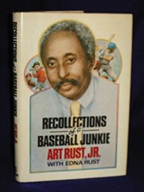
Art Rust Jr. is their Curt Flood for those hosting talk shows about baseball and other sports. And, like most baseball players who reap the spoils of modern economics thanks to Flood, sports talk show hosts rarely, if ever, extend a thank you to Rust.
By Stacy M. Brown ,NNPA Newswire Senior National Correspondent@StacyBrownMedia

In the glitzy world of sports talk radio, where mega-contracts make headlines and charismatic hosts dominate the airwaves, there is an unsung pioneer whose name rarely echoes through the halls of fame. As Tom Brady secured an industry-leading $375 million contract with Fox Sports, surpassing his legendary playing career earnings, and Jim Rome and Stephen A. Smith rake in tens of millions annually, there’s rarely a nod to the trailblazer who laid the foundation for this now lucrative profession — Art Rust Jr.
Rust was born in Harlem on October 13, 1927, and died in 2010 at 82. He was a maverick who changed the game of sports broadcasting. A graduate of Long Island University, Rust embarked on his broadcasting journey in the 1950s at New York radio station WWRL. His career included stints at WNBC, WMCA, and WINS Radio before he emerged as a pivotal figure with his groundbreaking show, “Sports Talk.”
While today’s hosts thrive on multi-million-dollar contracts and extensive coverage, Rust’s era was vastly different. Before the 1980s, sports talk radio and general sports coverage were limited to brief segments on the evening news and sporadic radio shows. Salaries barely covered the gas and tolls it took to arrive at a dusty Manhattan studio. Rust’s “Sports Talk” was a game-changer, giving fans a platform to engage in conversation for three hours every night. Not to mention, guests would include legends like Muhammad Ali, Sonny Liston, and Joe DiMaggio.
The “Walking Encyclopedia of Sports” finally had his moment in the spotlight during the tumultuous 1981 player/owner strike in baseball. Initially hired to host the Yankees pre-game show, Rust was on air every night from 6 p.m. to 9 p.m. during the summer strike, which birthed an all-sports talk radio show that captivated disheartened baseball fans and laid the groundwork for the likes of WFAN, which emerged in 1988 with an all-white crew and not even a mention or an invitation to Rust.
“Unlike today’s Sports Radio format, ‘The Art Rust Jr. Show’ was a lot more fan-friendly,” noted Steven C. Owens in an earlier piece for Medium. Rust’s wife, Edna, was an integral part of his journey, and her sudden passing in 1986 led him to honor her memory at the end of each show with a heartfelt “Good Night, Edna Baby.”
Rust’s impact remains undeniable. While Sirius XM’s Chris Russo, who got his big break at WFAN alongside Mike Francesca and others, raked in millions, Rust set the stage for their success. Steve Somers, a host at WFAN, acknowledged Rust’s role in shaping the station. “He certainly set the groundwork and the foundation for WFAN,” Somers asserted.
Rust affectionately referred to left-handed pitchers as “portsiders” and Yankee Stadium as “the big ball orchard in the South Bronx.” In his 1976 book, “Get That N****r Off the Field!” he recounted experiences of being a Black man in the world of baseball, highlighting the racial challenges he faced.
Longtime listener Alex Belth recalled listening to Rust in the early 1980s and how he tried to get up the nerves to call in and ask if Reggie Jackson would hit 500 home runs. “For years, I listened to Art Rust Jr. His voice was knowing and sure,” Belth recalled. “I felt safe in his company. Yeah, and Reggie got those 500 dingers, too.”
In an era where sports talk hosts command staggering salaries, there’s little reminder of Rust, a Black man who sowed the seeds that both white and Black sportscasters are reaping. Some equate today’s hosts with baseball players who fail to recognize former St. Louis Cardinal great Curt Flood.
Flood won seven consecutive Gold Glove Awards beginning in ’63 and hit better than 300 in six of his 12 years with St. Louis. Flood was also a key contributor to the Cardinals’ 1964 and ’67 World Series championship clubs. Flood, who, upon being traded to the Phillies on October 7, 1969, took a stand that would effectively end his career and change the sport forever.
He penned a letter to Commissioner Bowie Kuhn in which Flood began his fight against the reserve clause, which bound a player to one team unless that club chose to trade or release that player. Free agency didn’t exist, so Flood decided to challenge the system. After Kuhn refused to grant Flood free agency, Flood filed a lawsuit against the Commissioner and MLB, alleging a violation of antitrust laws. The case reached the U.S. Supreme Court in 1972, and justices ruled 5-3 in favor of MLB. No active players stepped out to testify—or even attend—the trial in support of Flood.
However, in 1976, the reserve clause disintegrated, and the groundwork for free agency as we know it today was laid. “The fact that Curt Flood, one of the best all-around players of his generation, was willing to risk it all for others is one of the greatest displays of personal sacrifice known to the sports world,” said Tony Clark, the executive director of the MLB Players Association, in an interview with MLB Network.
Flood’s fight forever transformed baseball economics. The average salary of an MLB player in 2023 was $4.9 million, or about ten times the amount Flood made over his entire 15-year career.
Art Rust Jr. is the Curt Flood for those hosting talk shows about baseball and other sports. And, like most baseball players who reap the spoils of modern economics thanks to Flood, sports talk show hosts rarely, if ever, extend a thank you to Rust.


Be the first to comment